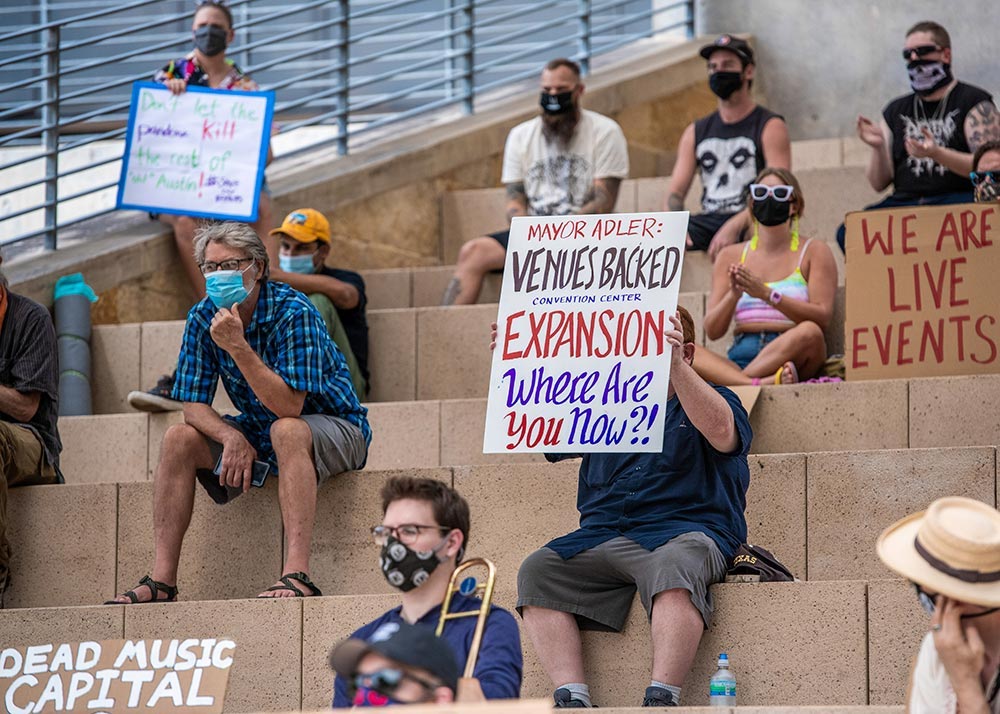City Council Approves SAVES Resolution to Rescue Venues, Bars, Restaurants
City will explore potential funding sources for struggling sectors
By Austin Sanders, 2:20PM, Fri. Sep. 18, 2020
As Austin’s iconic music and arts venues, bars, and restaurants continue to fold six months into the COVID-19 pandemic, City Council unanimously approved a resolution Thursday night directing staff to create a plan for providing relief to some of those establishments … in about two weeks.
The Save Austin's Vital Economic Sectors (SAVES) resolution, which gathered support and modification over the past two weeks from most council members, will also search for financial relief for child care centers. Together, each economic sector represents an industry that was forced to close early in the pandemic and continues to struggle to bounce back even as state orders allow them to serve an increasing number of people.
The COVID-related hardship doesn’t even take into account the challenge these industries were already facing in Austin’s booming real estate market – especially Downtown venues where rents were already unsustainable. It was just one year ago that Council voted to establish the Live Music Fund: a revenue stream sourced through taxes imposed on hotels that could be used to help prop up struggling creatives and the venue spaces that allow them to exhibit and perform their work.
Now, the work before staff is daunting and will be done under a tight timeline – Council expects ideas to be presented at their work session on Sept. 29, with votes on programs and recipients to follow on Oct. 1. With federal and local relief money completely dried up (and no additional state or federal help in sight), Council essentially took an everything-under-the sun approach with the SAVES resolution by directing staff to explore a range of potential funding sources.
Some proposed sources include allocating money from alley and street vacation sales; right-of-way fees; diversion of sales tax revenues; and the deferment of programs and projects that were already funded through the FY 2021 budget process. One potential source even calls for identifying some iconic businesses as “Visitor Information Centers” which could make them eligible to receive hotel tax money.

In addition, Council tasked staff to also create a new way to distribute any new funds after those in the creative sector have voiced frustration over the way the Better Business Bureau administered money allocated for various programs funded through the CARES Act.
On top of charging a 5% admin fee – sucking up an already-too-small bucket of money – CMs have been puzzled by the way some of the money was distributed. According to a staff report, for example, Kick Butt Coffee received $29.94 from the Small Business Grant Relief program and $21,693 from the Creative Space Disaster Relief Program, while other venues like Stay Gold and Cheer Up Charlies received $40,000 grants. It’s unclear what criteria the BBB used to distribute the funds, but CM Leslie Pool has asked staff to clarify how the BBB distributed funds and what criteria they used to select businesses.
The most likely vehicle for distributing any new funds is the creation of an Austin Economic Development Corporation (AEDC) – something that Council has considered for years. The AEDC will give Council and staff more control over how and to whom the money is distributed.
Whatever amount of funding staff comes back with on Sept. 29, however, won’t be enough. Pool said the financial need could exceed $75 million, which would far exceed the amount of relief the city has set aside in local funds. Mayor Steve Adler said that the Oct. 1 meeting, where Council could decide which of Austin’s instutions live and which die, will “not be an easy one.”
He added, “There is not going to be enough resources to help everybody,” and that the SAVES money should be viewed as a “really focused effort to try and save irreplaceable civic infrastructure.” Adler concluded: “I feel relative to the need, we’re only going to save a precious few. I don’t want to create an expectation that this is a magic bullet here.”
In addition to approving the SAVES resolution, which does not yet commit any funding toward saving music venues, Council also voted unanimously on three items that advance plans to expand the Convention Center (Pool abstained, because she wants more details on what the plan will look like). Though none of the items actually commits the city to spending what could amount to a $1 billion plan for expanding the CC, one Item did authorize investing $6.3 million in an escrow account that will be used to pay developers and property owners as expansion efforts proceed.
Council has pitched CC expansion as a way of revitalizing the eastern part of Downtown where the current facility sits for all residents – not just those actively attending a convention – by transforming it into a walkable and transit-friendly destination (a new Red Line station is expected to open in the spring of 2021) that promotes local businesses.
Preliminary plans suggest that the redeveloped site could host a new hotel and office tower, and the redesigned CC could include a paseo featuring local restaurants, as well as space for live performances. “It is by no means the last decision we’ll make,” CM Jimmy Flannigan said of the votes last night, “but it is what I imagine will be an amazing asset for the public, for residents, for music and arts, and for transportation.”
But the juxtaposition of investing funds into the convention industry – which even the city’s consultant, HVS Convention, Sports & Entertainment, admits has a rocky and uncertain path to recovery – while only voting to plan for investment in the venues, bars, and restaurants that sustain Austin’s tourism industry, did not sit well with the city’s creative sector. “There is absolutely no reason we should even be thinking of Convention Center expansion at this time,” local saxophonist and flautist Lauryn Gould said at a City Hall rally Wednesday organized by music venue advocates.
CM Kathie Tovo, who represents the Downtown area, was focused on the eastern part of the tract, where the existing CC currently sits. The plans presented thus far don’t show how that part of the site, which connects to the Palm District established last year, could be redeveloped. An amendment from Tovo directs staff to present plans to redevelop the eastern tract by Dec. 1.
Editor's note: An earlier version of this story did not include the $21,693 in CARES Act funds Kick Butt received through the city's Creative Space Disaster Relief program. The story has been updated to reflect this figure, as well as specify the source of funding for Kick Butt's Small Business Grant Relief grant.
Got something to say on the subject? Send a letter to the editor.
A note to readers: Bold and uncensored, The Austin Chronicle has been Austin’s independent news source for over 40 years, expressing the community’s political and environmental concerns and supporting its active cultural scene. Now more than ever, we need your support to continue supplying Austin with independent, free press. If real news is important to you, please consider making a donation of $5, $10 or whatever you can afford, to help keep our journalism on stands.
June 28, 2024
June 26, 2024
City Council, COVID-19, Live Music Fund, Save Austin’s Vital Economic Sectors resolution, SAVES resolution, Convention Center, Austin Economic Development Corporation, Jimmy Flannigan, Leslie Pool, Lauryn Gould, Come & Save It rally, City Hall, Kathie Tovo









